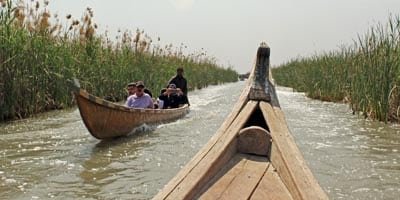In the World Bank report “Turn Down the Heat: Why a 4C Warmer World Must be Avoided”(Nov. 2012), World Bank President Jim Yong Kim gave these comments on climate change:
“The lack of action on climate change not only risks putting prosperity out of reach of millions of people in the developing world, it threatens to roll back decades of sustainable development.
This report spells out what the world would be like if it warmed by 4 degrees Celsius, which is what scientists are nearly unanimously predicting by the end of the century, without serious policy changes.
The 4°C scenarios are devastating: the inundation of coastal cities; increasing risks for food production potentially leading to higher malnutrition rates; many dry regions becoming dryer, wet regions wetter; unprecedented heat waves in many regions, especially in the tropics; substantially exacerbated water scarcity in many regions; increased frequency of high-intensity tropical cyclones; and irreversible loss of biodiversity, including coral reef systems.”
Coal-fired power plants are the largest contributor to the greenhouse gas emissions that cause climate change, yet coal was not mentioned at all in that World Bank report. And it wasn’t mentioned in a Washington Post editorial by Kim in January on the World Bank’s role in climate change.
1,199 new coal-fired plants are being proposed worldwide, according to the World Resources Institute.* China and India together account for 76 percent of the proposed new coal power capacities. Among the largest developers of new coal-fired plants are the “Big Five” Chinese power companies, the world’s biggest coal-fired power producers. China consumes more coal than the next ten largest consumer nations combined.
Japan, the World Bank and the US provide more than half of the world’s public international finance of coal-fired power plants.
Japan 27 projects, $10.1 billion
World Bank 29 projects, $5.3 billion
United States 23 projects, $4.2 billion
Asian Development Bank 21 projects, $3.9 billion
Germany 12 projects, $3 billion
China 7 projects, $3.1 billion
European Investment Bank 9 projects, $2.5 billion
European Bank for Reconstruction and Development 9 projects, $869 million
Others public funders: Italy, Korea, United Kingdom, the African Development Bank, Italy, France, Norway, Spain, Canada, the Black Sea Trade and Development Bank, Switzerland and Netherlands. Total: $37 billion for 156 projects.
* Ailun, Yang, and Yiyun Cui. 2012. “Global Coal Risk Assessment: Data Analysis and Market Research”. WRI Working Paper. World Resources Institute, Washington DC. Available online at wri.org.


